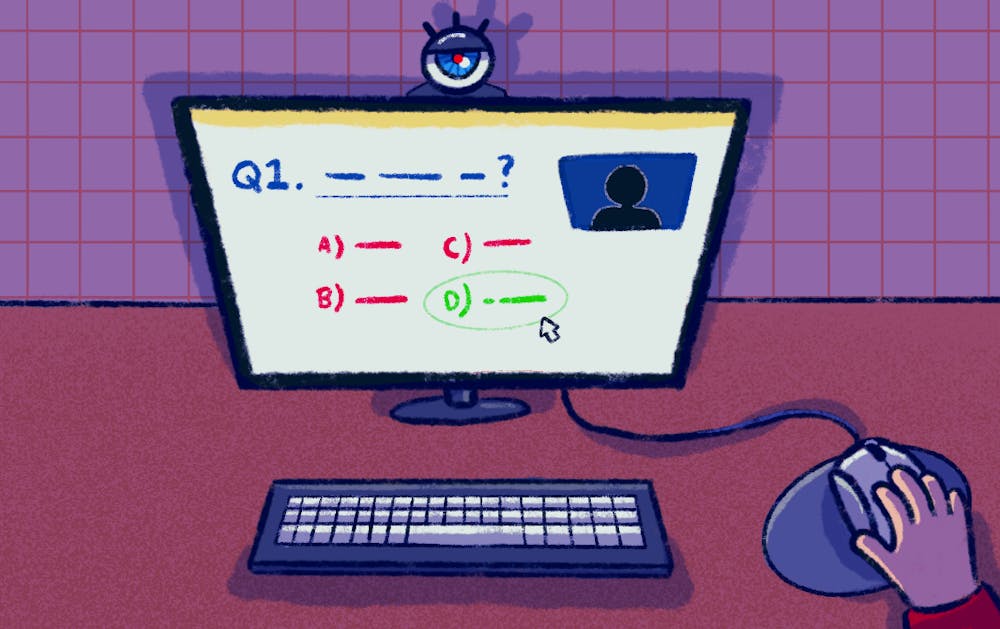With the rise of online learning, it is easier than ever for students to take their exams online. To ensure supervision and curtail cheating, online proctoring is becoming more popular.
Since ASU has moved to online classes for the entire spring semester due to COVID-19, Kyle Bowen, executive director of learning experience at the University Technology Office, said there will be an increase in online proctored exams.
"ASU offers several different approaches to proctoring that can support exams in Canvas or a range of different online tests," Bowen said.
What are online proctored exams?
Online proctored exams supervise students, usually with a software, to ensure they are are not cheating when they take an exam.
Justin Harding, senior director of instructional design and new media at EdPlus, said proctoring is a tool that ensures student integrity.
EdPlus is an organization at ASU that promotes digital learning and teaching to improve access for education for students all around the world.
Harding said a suite of tools is used "to ensure the integrity of the overall online test-taking experience."
ASU began to utilize online proctored exams in 2009 to offer a convenient option for online students or out-of-state students to take exams online.
Jessica Harper, a customer service specialist at the Experience Center, said online proctored exams not only help prevent cheating, but they also increase the sense of security for professors.
"It's a way for students to take their exams in an in-person environment even though they are in an online setting," Harper said.
How do online proctored exams work?
ASU currently uses two proctoring services: Respondus Lockdown Browser and RPNow.
Harding said Lockdown Browser utilizes a combination of screen recording and monitoring tools that restrict students from accessing other websites.
On the other hand, RPNow is focused on virtual and digital learning, and it does not completely prevent students from having other applications running on their computers. Additionally, it offers students a practice exam to take before the actual test.
"Both proctoring services can be reviewed by faculty and the third party to look for specifics around cheating," Harding said.
Once the student is finished, it is then reviewed by the company. If there are any signs of cheating, then the company will notify the professor, such as talking or looking away from the test.
The professors have access to all of the recorded videos, which disappear after two years.
Ara Austin, clinical assistant professor and managing director of online programs at the School of Molecular Sciences, said proctoring service companies are strict when it comes to flagging students, and often flag disruptions in the environment, such as dogs barking or a child entering the room.
"They're so strict on flagging my students that it's kind of annoying because a lot of my students have children that are young," Austin said. "Every once in awhile a 3-year-old comes into the screen because mom or dad is taking an exam, that's just what a 3-year-old does."
If there are reports of any suspicious activity, the professor will be notified once the exam closes.
Once the reports are generated, there will be a mark with three options: green, yellow and red.
Green means clear, yellow is suspicious, and red is a rule violation. Austin said if there is a red or yellow mark, she will go in and review the video.
How do they benefit students and faculty?
One of the benefits of online proctoring exams is offering one-on-one accountability.
Philippos Savvides, the assistant director of learning technologies for EdPlus at ASU, said the anti-cheating software results in accountability.
"In an online proctoring environment, that experience is one-on-one versus in a proctoring center in which one instructor is monitoring 20 students," Savvides said.
Austin said there is a stigma associated with online coursework, and online proctored exams can provide the same accountability students would have in an in-person class.
"There's still a lot of stereotypes about online education, so I want to administer the exams the same way and be fair to my on-campus students who are taking the exact same class," Austin said.
Additionally, it allows students to take exams from home rather than coming to a testing center.
Reach the reporter at anatar12@asu.edu or follow @AnushaNat1 on Twitter.
Like The State Press on Facebook and follow @statepress on Twitter.
Anusha NatarajanDiversity Officer
Anusha Natarajan is in her third year at ASU studying sociology, history, and political science. She previously served as a reporter for the community and culture desk for four semester and helps with Spanish translation and oversees diversity efforts in the newsroom.
Continue supporting student journalism and
donate to The State Press today.





